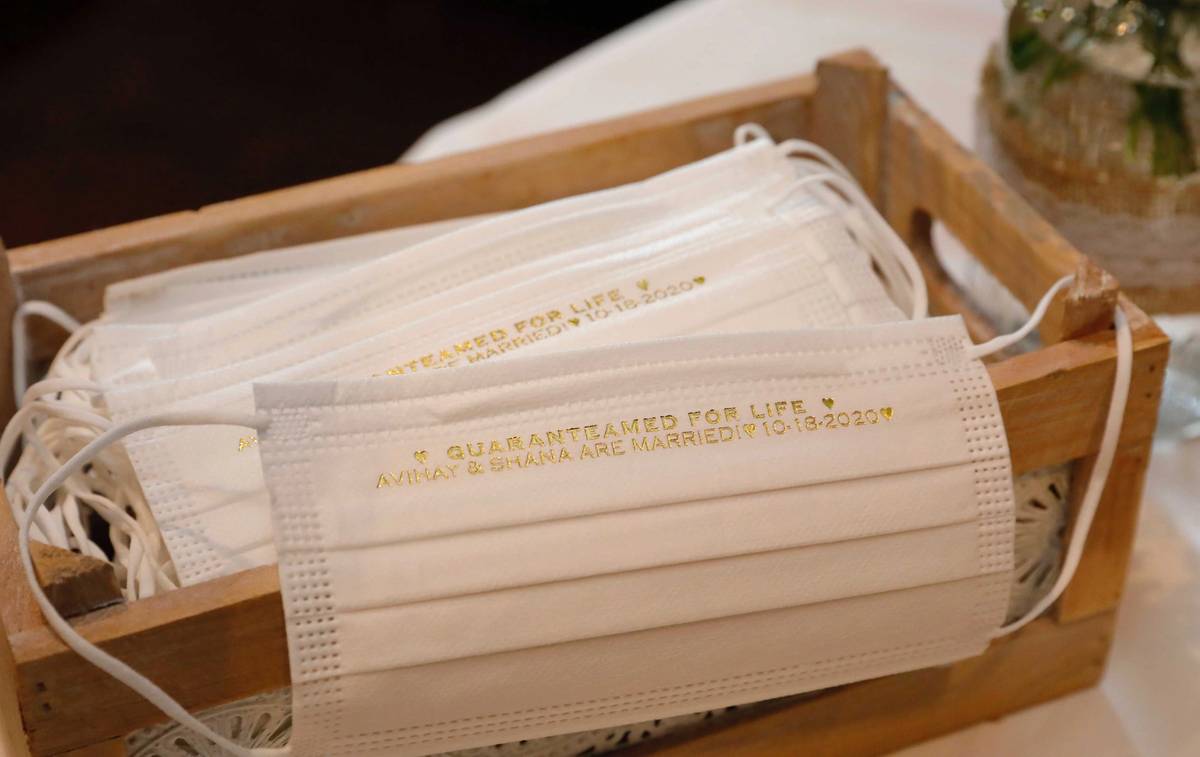Will the Coronavirus Wedding Model Outlive the Coronavirus?
The pandemic turned 300-person hotel weddings into 10-person backyard affairs. Some newlyweds say it was for the best.




The Plaza Hotel. Three-hundred-fifty guests. The groom’s college rabbi flying into New York from Senegal. By the first week of March, the florist was booked, the kosher catering was ordered, and the band was arranged. Josh and Sarah Weissmann would be married in April with all the pomp and circumstance that the 23-year-olds—but mostly their parents—could dream up, and surely, nothing would stand in their way.
Josh Weissmann had just one small concern: “I get very nervous with large events,” he said. “I’d never been to the Plaza … I had to go there multiple times to accustom myself with the environment, so I wouldn’t get awkward the day of.” On one of those trips early this year, still not comfortable with the space, he had an idea. “I stuck a little note to Sarah in a utility closet,” he recalled, hoping she would find it at the wedding as a surprise.
Sarah never got a chance to find the note. On a Saturday night mid-March, as a shelter-in-place order readied to sweep Manhattan, Josh gave a rushed goodbye to his roommates and Sarah packed her not-quite-tailored gown into the back of her car. Fast forward three weeks to the night of April 2: They were lying on the floor in the basement of Weissmann’s childhood home in Atlanta—fighting. Should postponing be on the table?
“And then,” Weissmann said, “we just looked at each other—well, Sarah convinced me—but we looked at each other and said, ‘There’s just too much uncertainty in the world. You can only latch on to things you know are certain.’”
Seventy-two hours later, they were married. Two backyards over from the house Josh grew up in, the couple gathered both sets of parents, Sarah’s two siblings, a rabbi, and one witness—the 10-person, protocol-abiding gathering permitted by the CDC at the time. The groom got up early to arrange chairs in the yard, the bride made her own bouquet, and two poles and a father’s tallis formed a makeshift chuppah.
The Weissmanns weren’t alone: The pandemic flung thousands of soon-to-be married couples into chaos when, on a dime, their best-laid plans came undone. While some elected to postpone their weddings indefinitely, many embraced the new possibilities that COVID-19 regulations laid out: Rooftops and backyards replaced hotel ballrooms, and road trips to parents’ homes replaced flights to international honeymoons. Although being forced to celebrate without some grandparents or other at-risk loved ones proved a painful sacrifice, for many who opted for humbler events, the change was almost a blessing in disguise—so much so, in fact, that some said their experiences could serve as a new and better model for weddings even in post-pandemic times.
“Now I can’t even imagine getting married in front of so many people,” said Alexandra Kreps, a doctor in her early 30s whose original wedding plan included 130 guests. “I’m just not that comfortable with big crowds.”
Exactly a year after their engagement Labor Day weekend of 2019, Kreps and her now-husband, Bryan Chesen, wound up on a rooftop in Brooklyn and started their lives together surrounded by a dozen loved ones. They briefly considered postponing, in part to include the bride’s tightknit Canadian family, but “there’s just no guarantees in life,” Kreps said. Incidentally, the hotel’s roof was where they wanted to get married in the first place, she said, but their exhaustive guest list had forced them into a larger space.
“People might use this as a new template for weddings,” Kreps said. “Maybe a couple friends, maybe just immediate family.”
College sweethearts and recent University of Maryland graduates Marc Leeb and Sarah-Leah Thompson loved the new template. The what-could-have-been version of their June 28 event was an already-booked, already-taste-tested 160-person wedding in Los Angeles, the bride’s hometown. When faced with reality, they decided to do what it took to keep their original date. Part of Thompson’s reasoning: “There’s a Jewish tradition that we learned about that once a couple sets the date for their wedding, they’re meant to get married on that date.”
On June 28, the two were married in the company of 14 friends at the Pearlstone Retreat Center, a kosher outdoor facility in Maryland—less than an hour’s drive from the campus where they first met.
“It was really special and meaningful and I couldn’t personally have hoped for anything better, not just given the circumstances, but overall,” Thompson said.
Rabbi Eli Backman, the newlyweds’ college rabbi who officiated their ceremony, noted a certain beauty in small weddings that he cautioned “we shouldn’t lose” post-pandemic. While “glamorous situations” often become stressful or performative, “in these weddings, the emphasis is very clear: ‘We want to get married because we’re in love and we want to begin a home together,’” he explained. And from the guests’ perspective, “When you’re part of 10, 12, 15 people, you’re there, and you know why you’re there, and you want to be there,” Backman added.
In the absence of bodies to fill the space with joy, those present often went above and beyond. “Our friends really stepped up,” Leeb said. “They knew there were only 14 of us, so they filled the room, the tent, with a lot of ruach and energy.”
But among the bodies missing, unlike at Weissmann’s or Kreps’ weddings, were the bride’s and groom’s parents—the result of what Thompson called “a series of the hardest decisions we’ve had to make.” To make their parents feel included in the life cycle event—in addition to via livestream from under the chuppah—the couple decided to embark on a COVID-safe six-day road trip, in lieu of a honeymoon: from a walk-by celebration with Marc’s parents in their front yard in Maryland, to Sarah-Leah’s parents in Santa Barbara, California, where the rabbi originally chosen to officiate their Los Angeles wedding conducted a civil ceremony.
At the end of the day, it turned out, “some things just didn’t matter,” Weissmann realized. “Sometimes a pig in a blanket is just a pig in a blanket,” he said, a motto of sorts that’s kept him grounded not just during his wedding but throughout the pandemic.
Many couples leaned into the reality of life under a pandemic rather than trying to work around it. Shana Fruchter and Avihay Ben Shabat had “Quaranteamed for Life” printed in gold ink on custom masks for their guests. Evan Ginsberg and Nancy Kaplan—who planned for 230 guests on March 29 and got 35 on Aug. 30—bought a dog as a “compromise” for postponing. (“I’d been wanting a dog for a long time,” Ginsberg said, and repeatedly apologized for the loud barking in the background during our Zoom interview.)
For Debbie Masters, leaning into reality meant that when her live-in partner of 13 years, Nick Fain, turned to her one afternoon and said, “Why don’t we just get married?” she replied, “You know, I’m thinking the same thing.”
The pandemic became the perfect excuse to have the small wedding Masters would have wanted regardless. On Sept. 15, they were married in the courtyard outside their temple in Lexington, Kentucky, with no one present but the rabbi and one witness. The other witness joined via FaceTime from her car in the parking lot, since she discovered on the morning of the ceremony that her son had been exposed to the virus.
“With everything going on in the world, there’s so much bad … there’s got to be some joy, something that gives hope,” Masters said. “Things are so bad right now, but this kind of makes it a little better.”

While some leaned in, others delayed acknowledging the new reality for as long as possible. In May, Tali Pelts and Gidon Halbfinger were still in denial, as Pelts buried herself in her Princeton undergraduate senior thesis work. The couple had been planning their 200-person, Jerusalem wedding for July 5 since their engagement over a year ago, and the thought of giving it up just when every aspect of it had fallen into place seemed too far outside the realm of possibility. But with her thesis submitted at the end of the month, Pelts could see clearly: The original plan was now, of course, impossible—so why keep waiting for July 5?
On June 15, they were married by Pelts’ college rabbi in a distant acquaintance’s backyard in Princeton, New Jersey. Although every COVID-19 precaution imaginable was taken—everyone drove, everyone wore masks, everyone social distanced—the hardest part of the wedding were the 14 days after it.
“We held our breath for two weeks after our wedding. What happens if someone who was at our wedding is infected?” Halbfinger said. Ultimately, none of the 25 attendees contracted the virus.
Like for many couples in their shoes, an upshot to the shift in plans was a chance to do the event fully on their own terms, something that having to cater to the needs of hundreds of guests often renders impossible.
“We felt the freedom to make the ceremony our own … it didn’t have to be perfectly standard with all the traditional formula,” Halbfinger explained. “Our wedding was going to be weird, that was already going to happen, so we may as well embrace it and do what we really want to do.” What they really wanted to do, it turned out, was a mostly egalitarian ceremony that would not have been possible in Israel “or even in the States at a wedding with 200 people,” per the bride, since they would have had to account for extended family’s religious practices.
To include those for whom it wouldn’t be safe to travel, they conducted sheva brachot over Zoom. Halbfinger’s grandmother joined virtually, even if only after a chorus of “Safta, unmute yourself!”
The most meaningful parts of the ceremony differed for each couple, but almost all could agree that, for all its drawbacks, the intimacy and warmth of the backyard-rooftop-10-to-15-person wedding couldn’t be matched. As the pandemic rages on, abiding by the new template continues as a necessity, but in the hopefully not-so-distant future, it will become one choice of many.
Will the unexpected experience of coronavirus weddings change how couples approach their special day? Or will we, as a collective, return to the hotel ballrooms, to the 350 guests, to the lavish rehearsal dinners?
Alexandra Kreps had one possible answer: “Screw the big rehearsal dinner, you know? Those smaller ceremonies for whatever reason just have more meaning to them, in a way.”
Marie-Rose Sheinerman is a fall journalism fellow at Tablet and a history concentrator at Princeton University on a year off as a rising junior.